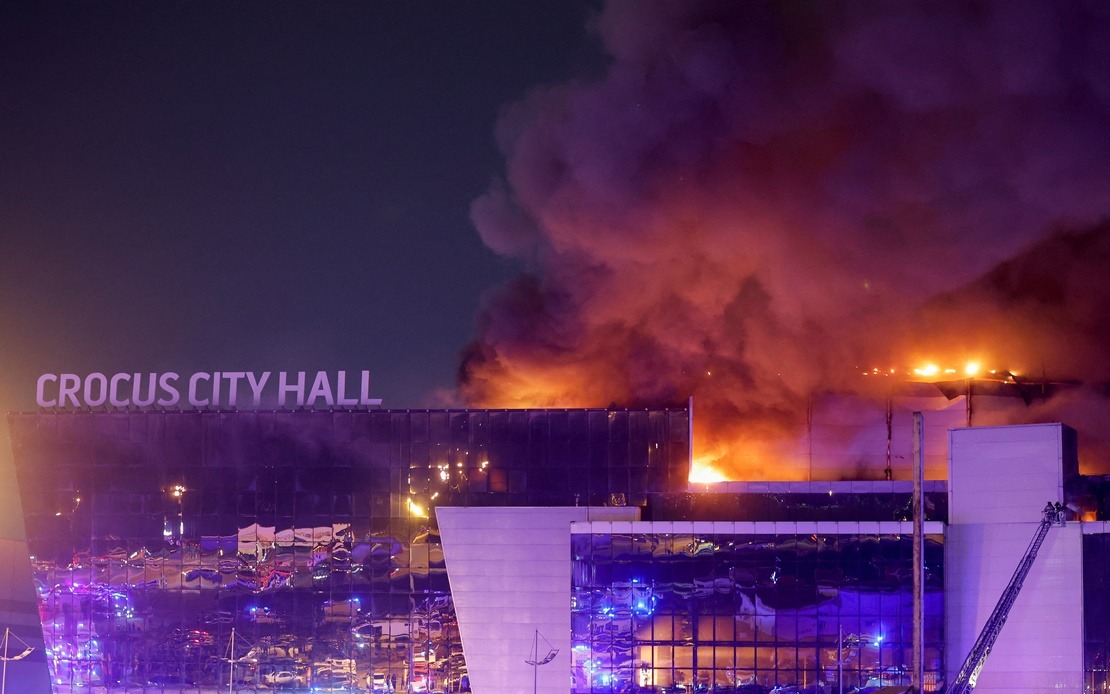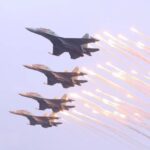A claim from Daesh. The attack which left at least 115 dead on the evening of Friday March 22 in a concert hall in the suburbs of Moscow, Russia, was immediately claimed by the Islamic State group.
The Kremlin announced this Saturday the arrest of 11 people, including 4 suspected attackers, arrested in the Bryansk region, bordering Ukraine and Belarus, according to the Russian Investigative Committee.
If Russian intelligence services claimed that the suspects had “appropriate contacts on the Ukrainian side” and intended to flee to this country, Moscow has not provided any evidence to this effect. Ukraine, for its part, assured that it had “nothing to do” with this attack.
Regular Daesh attacks in Russia
Daesh’s claim of responsibility for the attack was initially surprising. “We didn’t think much about this threat. Putin created an imaginary world in which the threats are the United States, the West and Ukraine,” admits Nadezda Kutepova, a Russian political refugee, on BFMTV.
Russia is also currently occupied by another front. “Obviously, for 2 years, Russian intelligence has focused on the Ukrainian threat,” underlines Patrick Sauce, international political columnist for BFMTV.
However, this attack is far from being the first carried out by the Islamic State group in the country. “Daesh has committed attacks (in Russia) which have not caused a lot of noise (in the West), but since 2016, there have been regular bomb attacks. There have been thwarted attacks too,” recalls our editorialist.
“At war with Russia” for a long time
“Daesh is a Sunni Salafist movement which has been at war against Russia for a long time,” explains Guillaume Ancel, former French officer, co-author of Goodbye Poutine, published in 2023, to BFMTV.
Tajikistan, from which some of the attackers are said to come, “is a former landlocked Soviet Republic, quite far (from Russia), but quite close to Afghanistan”, indicates Patrick Sauce.
It is also the only Iranian-speaking country in the region, in addition to Iran, with which it shares a border. Tajikistan is also part of a “mosaic of all-Muslim peoples whose common target is the Russian state,” according to Guillaume Ancel.
These countries have local demands and “during the Soviet era, the Russian state repressed all ethnic or linguistic demands” coming from these countries.
An “anti-Russian context” recovered by Daesh
These “ethno-separatist” type demands which are part of a “recurring anti-Russian and anti-Putin context” were then “rallied to the cause of jihad”, indicates Guillaume Ancel. This rallying can also be explained by the fact that “Russia intervened with unprecedented violence in Syria to drive out IS”, recalls the expert.
Wassim Nasr, journalist at France 24 and specialist in jihadism, even speaks of a “blood debt” between Russia and IS “which goes back several years, to the war in Syria or Chechnya”, on France Info this Saturday.
By recovering these local actors, initially driven by concerns of an ethnic nature and therefore not religious, this “allows IS to have a more powerful international influence”, estimates David Rigoulet-Roze, associate researcher at Iris and consultant in international relations, at BFMTV.
“Daesh is trying to show that it can act in so-called authoritarian states which give the impression of controlling their population, like Iran”, where a Daesh attack left 84 dead last January, analyzes Patrick Sauce.
From now on, “the relationship between Moscow and the jihadists is significant. It is all the more so since quite a few Caucasians have joined Daesh in recent years and served in Syria in particular”, indicates the researcher.
Still many questions
Concerning the exact identity of the attackers, it still remains uncertain. David Rigoulet-Roze, for his part, puts forward a hypothesis. “There is what we call the Ferghana Valley in Central Asia, which is considered a breeding ground for long-time jihadists. With the war in Afghanistan, Daesh has established itself in this region, that’s what we call it the Khorassan sector”, to which the attackers could belong, he said.
For Patrick Sauce, this group does “not necessarily” work by taking into account “the calendar of major global crises”. The attack therefore does not necessarily have a link with the Russian elections, but may rather correspond to the desire to “make a splash”.
“There are still many questions that remain unanswered given the fact that Russia is a country at war with significant surveillance,” David Rigoulet-Roze now emphasizes. The latter believes in particular that the attack “raises a certain number of questions about the performance of the Russian intelligence services”.
This article is originally published on fr.news.yahoo.com








